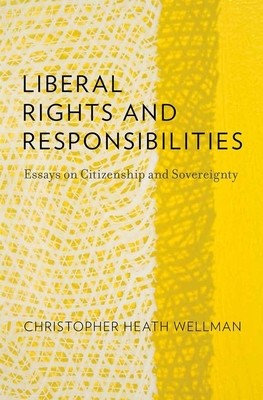
- We will send in 10–14 business days.
- Author: Christopher Heath Wellman
- Publisher: Oxford University Press, USA
- ISBN-10: 019998218X
- ISBN-13: 9780199982189
- Format: 16.5 x 23.4 x 2 cm, hardcover
- Language: English
- SAVE -10% with code: EXTRA
Reviews
Description
The twin questions at the heart of political philosophy are "Why may the state forcibly impose itself on its constituents?" and "Why must citizens obey the state's commands?" In Liberal Rights and Responsibilities, Christopher Heath Wellman offers original responses to these fundamental questions and then, building upon these answers, defends a number of distinctive positions concerning the rights and responsibilities individual citizens, separatist groups, and political states have regarding one another. The first four chapters combine to critically discuss standard theories of political obligation and then to introduce Wellman's samaritan explanation of our duty to obey the law. The next three papers challenge the traditional approaches to group autonomy en route to advancing Wellman's functional account of political self-determination. Next Wellman reviews group responsibility and argues that, in addition to discharging our individual moral duties, each of us must do our share
to ensure that the groups to which we belong do not perpetrate injustice. In the ninth chapter, Wellman invokes freedom of association to provide a defense of a legitimate state's right to unilaterally design and enforce an exclusionary immigration policy. The last two essays are on punishment; the first defends the rights forfeiture justification of punishment, and the second combines this rights forfeiture theory with the samaritan account of political legitimacy to explain why legitimate states may permissibly assume exclusive control over the enforcement of criminal law.
EXTRA 10 % discount with code: EXTRA
The promotion ends in 18d.05:46:24
The discount code is valid when purchasing from 10 €. Discounts do not stack.
- Author: Christopher Heath Wellman
- Publisher: Oxford University Press, USA
- ISBN-10: 019998218X
- ISBN-13: 9780199982189
- Format: 16.5 x 23.4 x 2 cm, hardcover
- Language: English English
The twin questions at the heart of political philosophy are "Why may the state forcibly impose itself on its constituents?" and "Why must citizens obey the state's commands?" In Liberal Rights and Responsibilities, Christopher Heath Wellman offers original responses to these fundamental questions and then, building upon these answers, defends a number of distinctive positions concerning the rights and responsibilities individual citizens, separatist groups, and political states have regarding one another. The first four chapters combine to critically discuss standard theories of political obligation and then to introduce Wellman's samaritan explanation of our duty to obey the law. The next three papers challenge the traditional approaches to group autonomy en route to advancing Wellman's functional account of political self-determination. Next Wellman reviews group responsibility and argues that, in addition to discharging our individual moral duties, each of us must do our share
to ensure that the groups to which we belong do not perpetrate injustice. In the ninth chapter, Wellman invokes freedom of association to provide a defense of a legitimate state's right to unilaterally design and enforce an exclusionary immigration policy. The last two essays are on punishment; the first defends the rights forfeiture justification of punishment, and the second combines this rights forfeiture theory with the samaritan account of political legitimacy to explain why legitimate states may permissibly assume exclusive control over the enforcement of criminal law.


Reviews